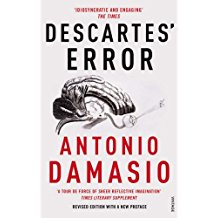 Descartes’ Error: Emotion, Reason and the Human Brain – Antonio Damasio
Descartes’ Error: Emotion, Reason and the Human Brain – Antonio Damasio
“I think, therefore I am” – The statement Descartes (1596 – 1650) is best known for, and still a principle which many hold fast to today.
But what does it mean, and, following from that, is it true?
That’s what the author sets out to explore, more specifically how the brain influences our subconscious behaviours, largely looked at from a perspective of knowledge of how an injured brain effects how we act and the rationally of our human behaviour.
From this the author, a distinguished neuroscientist, postulates that we are more than our brain and our thoughts – there is no meaningful separate existence of brain and body – the so called Cartesian duality. He describes the idea of a severed brain in a bucket, and stimulating the incoming (afferent) nerves – would this brain have a human experience? He suggests no, in the absence of the ability to create signals (efferent) back to the body (thankfully, I feel, the idea of being a captive brain feeling, but not able to act, sounds beyond torture – Hell, literally).
Part neuroscience, part philosophy, part postulation, this is not an easy read, but equally it’s accessible rather than being an academic text.
Recommended if you have in interest in this world of mind body philosophy.
Buy from Amazon using this link, and Yinspire earns a small commission
https://amzn.to/2LSqBez

